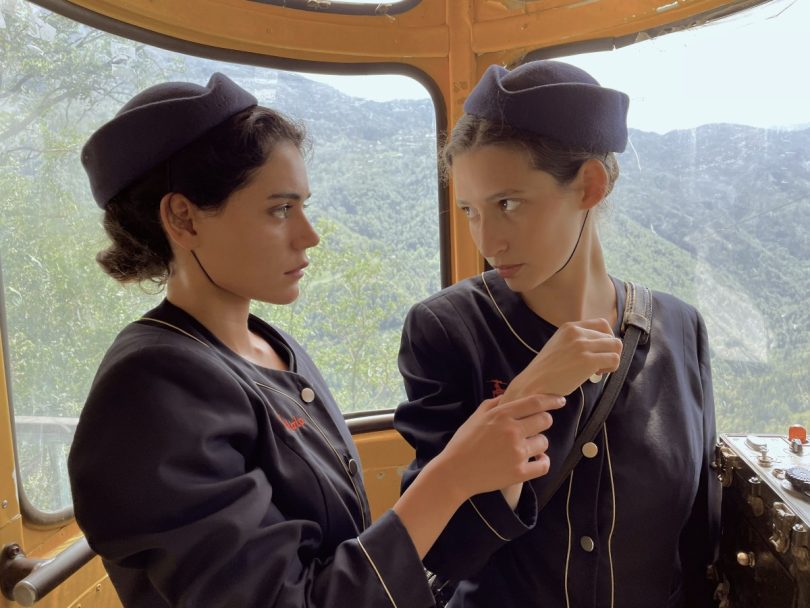Sign up for our Gay City News email newsletter to get news, updates, and local insights delivered straight to your inbox!
NewFest, New York’s LGBTQ Film Festival, returns Oct. 10-22 with dozens of queer features, shorts, and documentaries available in theaters with select titles available for streaming. The festival opens with the East Coast Premiere of “A Nice Indian Boy,” a romcom starring Karan Soni and Jonathan Groff. The festival closes with the vibrant trans narco musical, “Emilia Pérez,” an operatic story of love, violence, and the power of women. Here is a rundown of 10 films screening at this year’s fest.
Rita Moro Castro (Zoe Saldana) stars as a lawyer in Mexico City in “Emilia Pérez.”NewFest
“Emilia Pérez,” is a propulsive, audacious experience. Director Jacques Audiard’s film has Rita Moro Castro (Zoe Saldana), a lawyer in Mexico City, hired by the drug kingpin Manitas Del Monte (trans actress Karla Sofia Gascón in a dual role), to help him get a sex change. Four years later, Manitas, now Emilia Pérez, wants Rita to help her get her wife Jessi (Selena Gomez) and kids back. It’s a risky prospect because Jessi and their children are unaware of Emilia’s identity. Moreover, both Jessi and Emilia Pérez develop romantic feelings for other people. As a battle between Emilia and Jessi ensues, with Rita caught in the middle, “Emilia Pérez” builds to its explosive finale. The musical numbers, which include one about vaginoplasty, are fabulous and Saldana is sensational. While it may not be for all tastes, “Emilia Pérez” is just like its title character — unique, bold, and uncompromising. Audiard’s film is sensational in every regard.
The Brazilian import, “Baby,” opens with 18-year-old Wellington (João Pedro Mariano) being released from a juvenile prison. His parents have moved away, so he ekes out life on the streets until he meets Ronaldo (Ricardo Teodoro), a man more than twice his age, in a porn cinema. The sexual attraction between these guys is intense, and Ronaldo, a sex worker, takes Wellington under his wing. But Baby, as he is renamed, wants to do what he pleases, and when he rebels against Ronaldo, Baby takes up with Alexandre (Marcelo Várzea), a sugar daddy. Director/cowriter Marcelo Caetano presents Baby’s story in an elliptical narrative that shows the young man living by his wits and his looks. “Baby,” however, generates considerable emotions because of the tender romance between Wellington and Ronaldo. The attractive actors deliver lived-in performances, and the film’s gritty realism keeps the action spiky as Baby tries to avoid dangerous situations. This is a moody gem.
The stylish and smart low budget “transgender holiday film,” “Carnage for Christmas,” is prolific trans writer/director Alice Maio Mackay’s most accomplished horror film to date. Trans podcaster Lola (Jeremy Moineau) returns to her small hometown for the holidays only to encounter a Santa suited serial killer who is stalking members of the queer community. Because the local cops are useless — one identifies Lola as a person of interest in the case — Lola investigates the murders herself. The crimes echo the town’s famous case of the Toymaker murders, which is recounted early on in a nifty animated sequence during Lola’s podcast. Mackay keeps the action nimble as the bodies pile up and “Carnage for Christmas” features some gory special effects along with plenty of queer positivity. Moineau makes an ingratiating protagonist, and viewers may hope Lola gets more mysteries to solve.
“Extremely Unique Dynamic,” cowritten and codirected (with Katherine Dudas) by stars Harrison Xu and Ivan Leung, is a shaggy, amusing meta-movie about Ryan (Xu) and Daniel (out gay Ivan Leung), best friends in L.A. who will soon be separated as Ryan is moving to Edmonton, Canada. The film chronicles the buddies’ last weekend together. Rather than hang out, get high, and have fun, the straight Ryan coaxes the closeted Daniel into making a movie together — and a meta one at that. Ryan and Daniel will play Gregg and Tim, who will play Jake and Jasper in the film within the film within the film. Suffice it to say, things get complicated, but this silly film showcases its stars well.
“Gondola” is a sweet, wordless lesbian romance from Georgia. Iva (Mathilde Irrmann) arrives in a mountain village and gets a job working as conductor in a gondola. Her colleague, Nino (Nini Soselia), flirts with her — they play chess, and share food (even in mid-air!) and play music. Nino also elaborately designs her gondola and wears costumes (e.g, an astronaut going to Mars), or performs a nighttime striptease to attract Iva. Their love language is charming. “Gondola” is slight and gentle, and like Nino’s seduction of Iva, hard to resist.
Cole (Andrew Rannells) and Dom (Nick Kroll) in “I Don’t Understand You.”Newfest
“I Don’t Understand You” is a darkly humorous but very funny comedy about miscommunication. Married gay couple Dom (Nick Kroll) and Cole (Andrew Rannells) are celebrating their 10-year anniversary in Italy. During their trip they learn they will become fathers as the pregnant Candice (Amanda Seyfried) has selected the couple to adopt her baby. However, this good news comes at an awkward time. Cole and Dom are in crisis mode, having made a wrong turn on the way to a restaurant. Lost and stuck in the woods in a storm, they mistake a local farmer’s (Arcangelo Iannace) good intentions for evil. Likewise, when they do arrive at the intended restaurant, the owner, Zia Luciana (Nunzia Schiano), speaks in Italian, and they don’t understand her. (Subtitles reveal what Zia and the farmer are saying.) Making matters worse, Zia’s son Massimo (Morgan Spector) — who does speak English — arrives, but his accent is very thick, causing more confusion. As Dom and Cole suspect homophobia, tensions escalate, and accidents happen. The high-strung performances by Rannells and Kroll are inspired, and the film gets funnier with each outrageous mishap.
Queer non-binary writer/director Amrou Al-Kadhi’s appealing opposites-attract romance, “Layla,” charts the bumpy relationship between Layla (Bilal Hasna), a genderqueer Palestinian drag performer, and Max (Louis Greatorex), a “boring” white marketing executive. They meet cute at a corporate Pride event and begin a relationship, but the question arises: Is Max, who appreciates Layla being “as big as possible,” using Layla for an “exotic holiday”? Both Layla and Max shapeshift as scenes depict Max’s tone-deafness in Layla’s world, and Layla’s difficulties in Max’s. This allows for teachable moments about pronouns, and forces Layla to reconnect with their estranged sister, Fatima (Sarah Agha). “Layla” is all about the characters reinventing or defining themselves, which makes it compelling even when the film gets contrived. If the messages about being oneself are not new, they are delivered in an attractive package. Hasna is incredibly charismatic, and Layla’s outfits are quite fabulous, but the film itself is rather conventional — outside of a particularly kinky sex scene. If “Layla” shoehorns in a few too many issues, it is still largely worthwhile.
“Lilies Not for Me” is based on historical events; in the 1910s and 1920s, testicular transplants were designed as a method to cure gay men of their homosexuality. Writer/director Will Seefried uses this idea to recount a story about Owen James (Finn O’Shea of “Handsome Devil”), a novelist in the 1920s, who is currently institutionalized. A nurse (Erin Kellyman) has been assigned to cure him of his homosexuality. The story toggles back and forth between past and present as Owen recounts living in the country with Philip (Robert Aramayo), a doctor he loves who has returned from the war. Philip wants to test his transplant procedure to “eradicate their immoral desires.” Owen reluctantly agrees in exchange for a night of passion. And while Owen is asked to perform the surgery on Philip, he refuses to undergo the procedure himself. Things become more strained when Owen initiates a relationship with Charles (Louis Hoffman), a young man who comes looking for his father. “Lilies Not for Me” is handsomely mounted and sensual as this romantic triangle plays out, with the medical scenes injecting the film with a coldness that emphasizes just how insidious it is to “change” human nature. Seefried raises some valuable ethical questions, but he also leans towards heavy-handedness, using slow-motion and magical realism to drive home the tragedy of how gay men were treated in the era. Despite its flaws, the film does offer appealing performances by O’Shea and Hofmann, who have a wonderful chemistry together.
Esteban Arango’s “Ponyboi” features an intersex title character, River Gallo, who wrote and directed the original 2019 short.Newfest
“Ponyboi” directed by Esteban Arango, provides an excellent showcase for writer/producer/star River Gallo as the intersex title character — if only the film, expanded from a 2019 short, were as good. The messy plot has sex worker Ponyboi accidently killing Lucky (Stephen Moscatello), with some sketchy crack supplied by Vinnie (an overemoting Dylan O’Brien). Fleeing the scene — and taking Lucky’s briefcase full of money — Ponyboi hopes to run away with Bruce (Murray Bartlett), a kind stranger they meet that night. (It’s Valentine’s Day.) But first Ponyboi hopes to square things with their best friend, Angel (Victoria Pedretti), who is pregnant with Vinnie’s baby. (Ponyboi is also sleeping with Vinnie.) Adding to Ponyboi’s stress is their need for testosterone, which leads to a sex-for-drugs encounter in a pharmacy. An additional subplot involves Ponyboi’s dying father, a man they have not seen in 7 years. (This storyline incorporates some of Gallo’s own experiences of having intersex surgery; they were one of the subjects in last year’s documentary, “Every Body.”) The various and contrived narratives pull Ponyboi — both the character and the film — in too many directions, lessening the emotional and dramatic impact. The ambitious “Ponyboi” fails to live up to its full potential, but it does have an affection for Jersey, with references to Springsteen and diners.
In “Throuple,” Michael (Michael Doshier, who wrote the screenplay) meets the married but open couple Connor (Tommy Heleringer) and George (Stanton Plummer-Cambridge) and he unexpectedly becomes involved with them. The experience is empowering for Michael, who wants a relationship. While George admits being crushed on Michael, he and Connor agree to see other people and jealousies arise. Michael’s new romance also impacts his codependent relationship with his bestie, Tristan (Tristan Carter-Jones), whose girlfriend Abby (Jess Gabor) has just proposed — the needy Michael drives a wedge between them. Doshier’s character is not always likable, but the supporting characters are appealing. A speech Abby delivers is gratifying, as is watching Connor and George navigate their open relationship. These moments keep the amateurish “Throuple” watchable.
For tickets, showtimes, and more information about what films are available online, visit https://newfest.org/festival/
“NewFest” | October 10-22 in various cinemas and online







